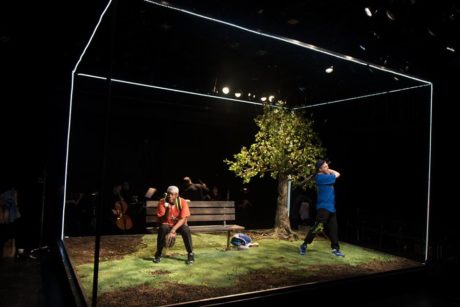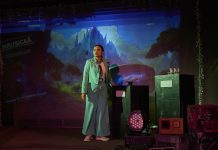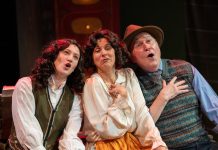The two men stand at opposite ends of an urban park, on a day that is a mere heartbeat away from the landmark midpoint in the calendar year. Summer and it is an evening to capture the heat that won’t last forever or take pleasure in the cool dappled shade of a leafy tree. It’s as American as baseball and the 4th of July. Just so, UrbanArias, conducted by Robert Wood opens the premier production of Independence Eve by composer Sidney Marquez Boquiren and librettist Daniel Neer. Live music performed by Inscape Chamber Orchestra is compact and atonal, without blemish and surprisingly driving. This is compact opera that lays social concerns at your feet. It is as current as the most recent headlines, presenting a packed and densely conversant picture of race in America during the civil rights era 50 years past, the present day, and an imagined future 50 years ahead.

The setting is a simple park bench where two individuals meet. Much more complex is the racial attitudes seen in these different decades, with characters of different generations. Director Shaun Patrick Tubbs begins and ends each segment as a face-off between the two, a short distance that must be traveled, yet millions of miles away. Over the course of the three scenes, baritone Jorell Williams and tenor Brandon Snook become younger, while the timeline is linear from past to future. The twist works to advantage. In Scene 1 set in 1963, Louis (played by Jorell Williams) is a hotel porter enjoying a bag lunch on the park bench, listening to the game, waiting for the next big play to take shape and simply minding his business? Sam (played by Brandon D. Snook) is a white policeman. The policeman, with his back to the porter, speaks over the shoulder in friendly exchanges. It is baseball that occupies their sliding arms-length conversation. Memories take hold of a father-son practice, and a ‘grounder’ and the lesson to “run upon it and scoop it up.” Relocation, the upheaval of the civil rights movement and changing demographics of the community eventually wiggle into the discussion. Baseball is the common ground, but with these two working men of 1963, it is a ground that can’t be covered.
Projections by Steven C. Kemp reveal glimpses of a big game, moving us ahead in time, buffeting between scenes. On the shaded turf, you grasp to make sense of what you are seeing, but the fragments add up, casting us back to the familiar.
Baseball demographics reveal the spread of integration; in 1963 80% White, 11.7 % Black, 8.2% Latino; and today 63% White, 6.7% Black, and 27.4% Latino.
The second scene finds Sean (played by Jorell Williams) on his cell phone. The tree sculpture by Louise Brock fills his space. It seems as an anchor, something familiar to hold onto, because Sean is in anguish. Joe (played by Brandon D. Snook) is an old best friend. They are buddies having grown up together, but white privilege stands out. They are both successful but Sean, the black investment banker has been treated like a criminal, shamed on his own doorstep. Fiction not lying far from fact, African-American literary critic and Harvard University scholar Henry Louis Gates was arrested in 2009 for a break-in at his own home. Makes you wonder how well we know each other. Do you know your neighbor across the street, or who lives next door? With the interplay of race relations and law enforcement, the impression of a black man in a business suit differs greatly from an assumption about a black man donning sweats or a hoodie.
The final scene finds Max (played by Jorell Williams) and Phillip (played by Brandon D. Snook) as 10-year-old boys. Both Williams and Snook come charmingly alive as 10-year-olds, boasting about a father, or somewhat shamed by circumstance. The future has pushed people and 10-year-olds must now know where they will be going. They have to take a test; they must pass the test because it will determine the future. Max quizzes Phillip with the questions, adding a humor that we can imagine while hoping it never comes true.
Lighting design by Alberto Segarra creates expressive light and shadow, moving us forward through the decades. In this fully realized libretto, the singers pull heavy weight with dialogue that is conversational with barely a pause and characters that are embodied in graceful maneuvering around a simple park bench on a nice summer day. You might not come away with a song you can hum, but you will come away with a memory of the words you have heard in this place, just like so many others, in America, on a holiday in the heat of summer, or practically on any other day. Race relations are still every part of the conversation.
Running Time: 60 minutes, with no intermission
Independence Eve plays through June 11, 2017, at Urban Arias, performing at the Signature Theatre’s ARK Theater – 4200 Campbell Ave., Arlington, Virginia. For tickets, call (703) 820-9771,or purchase them online.





